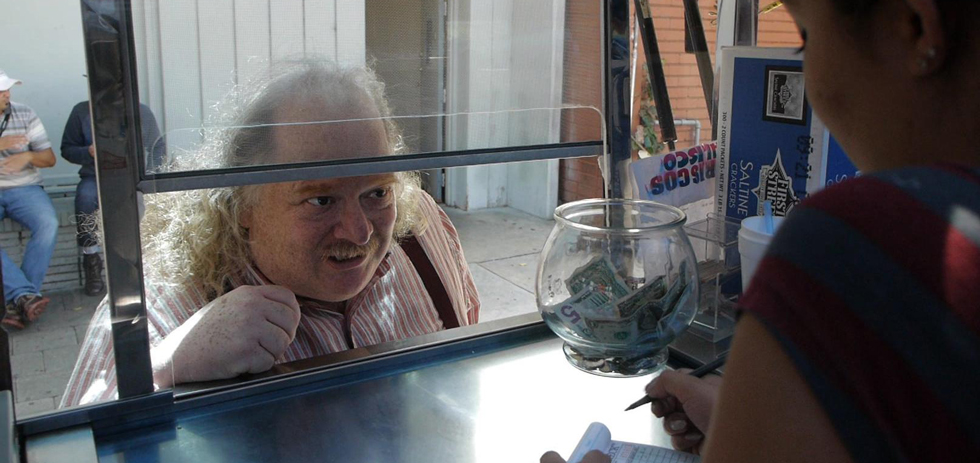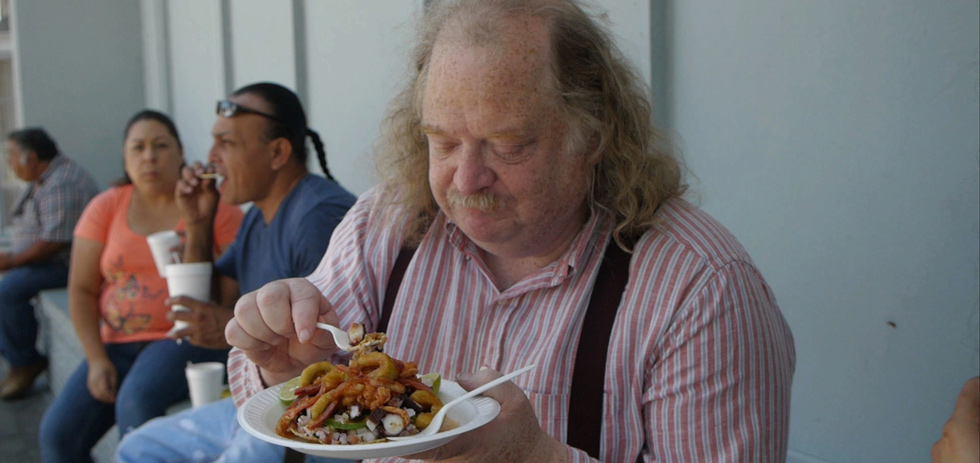
You’re keenly aware of the food documentary, those pretty and oft-undercooked films about food preparation masquerading as character studies. You’re also aware of the trappings of the biographical documentary, so often straying into hagiography and eschewing natural messiness for neatly partitioned ‘chapters of life’. The collision of these two forms is, for you, something to maybe throw on Netflix when you’re bored, material primed to allow your mind to switch off. You don’t expect much from these films, but that might be because you haven’t yet seen Laura Gabbert’s City of Gold.
Jonathan Gold, the only food critic to ever win a Pulitzer Prize, roams Los Angeles in his beloved Dodge truck, pointing out worthwhile landmarks not unlike architectural critic Reyner Banham in the 1972 BBC documentary Reyner Banham Loves Los Angeles.1 The difference is that Gold isn’t so much trying to educate, or even craft a passionate argument for dining; in these asides – his remarks are casual anecdotes, softly spoken remembrances of a city’s culinary past interwoven with his own.
One of the early hurdles for Gabbert’s biographical documentary is in the need to distinguish itself from television programs about food – not so much My Kitchen Rules or Chopped as PBS’s In The Mind of a Chef.2 Whilst City of Gold is packed, naturally, with sequences inside restaurants and talking head interviews with restaurateurs and chefs, its casual air is what sets it apart. This is a shaggy dog of a documentary, wonderfully scattered in focus and wholly unpretentious. In short, it was one of the biggest surprises of the Melbourne International Film Festival, a consistently delightful and endearing film about food, culture, family and writing.
Though it includes many interviews with restaurant owners whose businesses soared after a positive review from Gold, the film never feels like an act of adulation; so many of these stories are touching reminders of the power of human understanding and connection, not just an appreciation of food. Gold circles back on the restaurants that he’s raved about, and though there’s a clear distance between the critic and the restaurants he reviews, a strange bond is formed between them – he’s the rare cultural critic who seems to truly believe in the people whose work he praises.
As much as the film does manage to convey this beautiful notion, it also actively seeks to undercut the idea of the critic as somehow being above their subject. He approaches a streetside taco truck (Marisco Jaliscos in Boyle Heights) to ask about a special taco they tweeted out earlier that morning. Gabbert then holds on Gold and his wife, Laurie Ochoa, the Arts and Entertainment editor at the LA Times, as they share the food sitting on a nearby bench. That frankness and love of food and its culture is what gives the film its authenticity. A lot of the humour in the film actually comes from subverting the pretense of the critic, a running gag is Gold’s chronic procrastination, with the Los Angeles Times’ seemingly long-suffering Alice Short chasing him up for a feature on the Grand Central Market and his Lucky Peach editor Peter Meehan comparing having to chase Gold for a review to “like being someone’s teenage stalker”.3
Because of its subject, the film manifests itself as a moving and multifaceted look at criticism and writing more broadly. What becomes immediately apparent in the film is the potency of and poetry in Gold’s prose; some of his reviews are read out as a voiceover, Gabbert not necessarily matching them up with footage from that particular restaurant or singling out a dish, but rather relying on landscape shots courtesy of cinematographers Jerry Henry and Goro Toshima, often captured by a camera on a drone. The film seems fully aware of its strange relationship with the idea of criticism, almost pre-empting its own reviews not only through its subject matter but also the way in which it addresses wide-reaching issues across all forms of cultural criticism.4 Of particular note is a digression about what criticism is in the age of the internet, where sites like Yelp turn everyone into miniature food critics. A rebuttal on that front seems not to be mode of delivery – Gold is seen on public radio station KCRW, and reads reviews from his time at the LA Weekly and now at the LA Times – but a sense of personality and authorial voice that certain writers bring to their profession.5

There’s an amusing air of tug-of-war to the documentary as well, with Gabbert attempting to make a film about Jonathan Gold, and Gold wanting to redirect the attention onto the city and the food he loves. Portions of the film give way to Gold’s desire to point out some great locations for restaurants (the wonderful portmanteau Tehrangeles among them), an animated map of the city the only real over narrative divider in the film, and his off-the-cuff comments are edited together into a hilarious line of non-sequiturs; “people not from Los Angeles sometimes don’t understand the beauty you can find in mini-malls”; “that’s the remaining Chinese-Islamic restaurant”; “that place is famous for boiled ox penis in its Phở”. In exchange for that, Gabbert gets an in-depth look at Gold’s childhood; relatively traditional but surprisingly powerful considering it arises only in the film’s final half-hour.
Particular praise has to go to editors Greg King and William Haugse, whose work sees the film flow almost like a natural conversation, jumping through disparate points like Jonathan first meeting Laurie and the idea of anonymity in food criticism with ease. There’s also a wealth of humour in cutting to the reaction shots of chefs as they realise Jonathan Gold has just entered their restaurant – one of the biggest laughs of any film this festival came from seeing the look of panic emerge on the face of renowned chef Ludo Lefebvre.6
The sound mixing and music supervision is likewise impressive, bolstering Bobby Johnston’s playful musical score with some surprising song choices, drawn from Gold’s 2009 playlist on KCRW’s Guest DJ Project.7 Though Gold reading his moving piece in response to the 1992 LA Riots is positioned as the coda to the documentary, there’s no shortage of emotionally charged moments. One more unexpected than the rest comes as Gold is delivering the commencement address to the UCLA class of 2013. His self-deprecating jokes are underscored (non-diegetically) by Dr. Dre’s “Nuthin But a ‘G’ Thang”, a song Gold wrote about when he was on the music beat at the LA Weekly at the dawn of the ’90s. In that moment, the juxtaposition of the song and footage of Gold’s daily life seems to almost encapsulate the bizarre and beautiful cultural mesh in the city of LA, the music of Dre and Snoop Dogg reflecting the artistic voice of a city in flux.
Gold’s greatest virtue, at least according to the chefs whose work he reviews, is his intuitiveness, that he can piece together their intentions in a way they themselves couldn’t articulate. Like those chefs, Gabbert doesn’t attempt to neatly present a portraiture of a man or a city, leaving us to interpret and intuit the scattered pieces of Gold’s life for ourselves. For some, City of Gold might just seem like an interesting and intimate distraction, but for others, it will appear as a powerful love letter to the art of discovery. In the words of Gold himself, “I know it’s overly romantic.”
